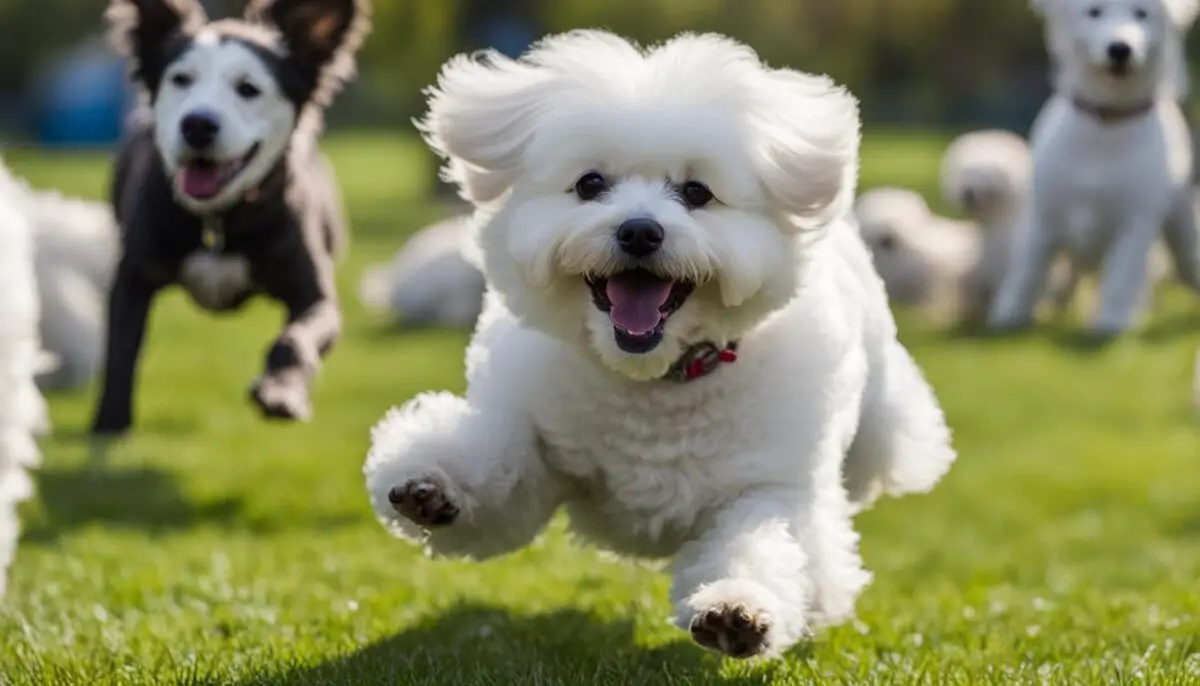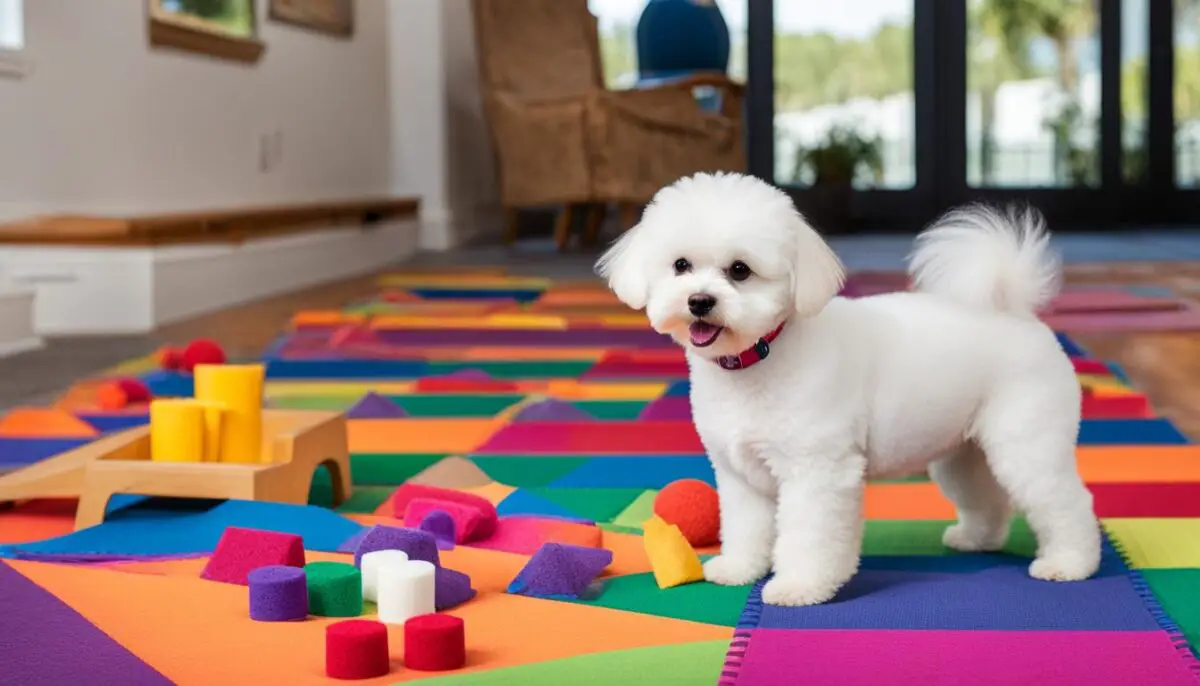As a pet parent, it is important to understand and address the behavior problems that can arise in Bichon Frise dogs. Training a Bichon Frise puppy early on is crucial in preventing and correcting behavior issues later in life. Factors that influence a dog’s behavior include heredity, experience and learning, and physiology. By working with your Bichon Frise while they are young and consistently using effective training methods, you can prevent or correct behavior problems and have a well-behaved companion.
Key Takeaways:
- Training a Bichon Frise puppy early on is important for preventing behavior problems later in life.
- Heredity, experience, and learning, and physiology all influence a Bichon Frise’s behavior.
- Consistent and effective training methods can prevent or correct behavior problems in Bichon Frises.
- Understanding the breed’s temperament and characteristics is essential in addressing behavior issues.
- Preventing and addressing common behavior problems such as housebreaking difficulties, separation anxiety, excessive barking, and destructive behavior is crucial for a harmonious relationship with your Bichon Frise.
Bichon Frise Behavior Problems
Understanding Bichon Frise Behavior
The Bichon Frise is a delightful breed known for its merry temperament and inquisitive expression. They are generally easy to live with and enjoy playing games and snuggling. However, like any dog, they can exhibit behavior issues that require understanding and training.bichon frise training tips
Bichon Frise temperament: Bichon Frises are generally friendly, affectionate, and social dogs. They love to be the center of attention and are usually good with children and other pets. Their happy-go-lucky nature makes them a joy to be around.
Bichon Frise personality: Bichon Frises have a charming personality characterized by their playful and curious nature. They thrive on human companionship and enjoy being part of the family. However, they can also be sensitive and may require gentle handling and positive reinforcement in training. dealing with bichon frise aggression
Quote: “Bichon Frises are known for their cheerful and lively personalities, which make them great companions for families and individuals alike.” – Bichon Frise enthusiast
Bichon Frise training: Like any dog, Bichon Frises benefit from early and consistent training. Positive reinforcement methods work best with this breed, as they respond well to praise, treats, and play. It is important to establish clear boundaries and rules from the beginning to prevent behavior issues from developing.
| Common Bichon Frise Behavior Problems | Training Solutions |
|---|---|
| Housebreaking difficulties | Consistent crate training and a designated potty area |
| Separation anxiety | Gradual desensitization to being alone and providing mental stimulation |
| Excessive barking | Establishing oneself as the leader and using positive reinforcement |
| Destructive behavior (chewing, digging) | Providing appropriate chew toys and redirecting behavior |
Understanding the Bichon Frise’s temperament and personality is key to addressing behavior problems effectively. By providing them with appropriate training, socialization, and mental stimulation, you can have a well-behaved and enjoyable Bichon Frise companion.bichon frise separation anxiety
Housebreaking a Bichon Frise
Housebreaking a Bichon Frise can be a challenging process, as this breed is known to be one of the hardest to house train. However, with consistency and patience, you can successfully teach your Bichon Frise to use designated potty areas and eliminate accidents in the house.
One effective method for housebreaking is crate training. Bichon Frises are den animals by nature, and a crate can provide them with a sense of security and a designated space for sleeping and resting. When introducing your Bichon Frise to the crate, make sure it is a comfortable and inviting environment with soft bedding. Use positive reinforcement, such as treats and praise, to encourage your dog to enter the crate willingly. how to handle bichon frise barking
In addition to crate training, providing a covered potty area can also aid in the housebreaking process. Bichon Frises prefer privacy when eliminating, and a covered area can help create a suitable environment for them. You can use a puppy training pad or create a designated outdoor potty area with a cover or privacy fence. Be consistent in taking your Bichon Frise to the designated area after meals, naps, and playtime, and reward them for eliminating in the correct spot.
Housebreaking Tips for Bichon Frises:
- Establish a consistent routine for potty breaks, feeding, and playtime.
- Use positive reinforcement, such as treats and praise, to reward your Bichon Frise for eliminating in the correct spot.
- Supervise your dog closely and be vigilant for signs that they need to go potty, such as sniffing or circling.
- Accidents may happen during the housebreaking process. If your Bichon Frise has an accident, clean the area thoroughly to remove any lingering scent that may attract them to eliminate in that spot again.
Remember, consistency and positive reinforcement are key when housebreaking a Bichon Frise. With patience and dedication, you can successfully teach your furry friend to potty in the appropriate areas and have a well-trained companion.

Dealing with Separation Anxiety in Bichon Frises
Bichon Frises are known for their social and dependent nature, which can make them prone to separation anxiety. When left alone for long periods, these dogs may experience anxiety and exhibit behaviors such as destructive chewing and excessive barking. It is crucial for pet owners to understand the signs of separation anxiety and take steps to help their Bichon Frise cope with being alone.solving bichon frise behavior issues
To address separation anxiety in Bichon Frises, gradual desensitization is key. Start by leaving your dog alone for short periods and gradually increase the duration as they become more comfortable. Provide them with engaging toys and mentally stimulating activities to keep them occupied while you’re away. Creating a safe and comfortable space, such as a cozy crate or designated area with their favorite blankets, can also help alleviate anxiety.managing bichon frise fearfulness
Additionally, incorporating positive reinforcement training techniques can be beneficial in managing separation anxiety. Reward your Bichon Frise with treats and praise when they exhibit calm behavior while alone. Avoid punishing or scolding them for anxious behaviors, as this can worsen their anxiety. If necessary, consult with a professional dog trainer or behaviorist for guidance and support in addressing separation anxiety in your Bichon Frise.
Key Strategies for Dealing with Separation Anxiety in Bichon Frises
- Gradual desensitization: Start with short periods of alone time and gradually increase them to help your Bichon Frise adjust.
- Provide mental stimulation: Engaging toys and puzzles can keep your dog occupied and distract them from anxiety.
- Create a safe space: A cozy crate or designated area with familiar items can help your Bichon Frise feel secure when left alone.
- Use positive reinforcement: Reward calm behavior with treats and praise, and avoid punishing or scolding anxious behaviors.
- Seek professional guidance: Consult with a dog trainer or behaviorist for expert advice tailored to your Bichon Frise’s specific needs.
By implementing these strategies and being patient and consistent, you can help your Bichon Frise overcome separation anxiety and feel more comfortable when left alone.
| Common Signs of Separation Anxiety in Bichon Frises | Management and Coping Strategies |
|---|---|
| Pacing or restlessness before you leave | Gradual desensitization to being alone, provide mental stimulation |
| Destructive chewing or scratching | Provide engaging toys, crate training, create a safe space |
| Excessive barking or howling | Use positive reinforcement, reward calm behavior, consult with a professional |
| House soiling when left alone | Establish a regular potty routine, consider using a covered potty area |
Managing Bichon Frise Barking
Bichon Frises are known for their tendency to bark, and it is important for pet owners to address this behavior early on. Excessive barking can be a nuisance for both the owner and neighbors, so it is essential to manage and control it effectively. By understanding the reasons behind Bichon Frise barking and implementing proper training techniques, you can prevent or reduce excessive barking in your furry companion.correcting bichon frise destructive behavior
Bichon Frises are alert and sensitive dogs, which can make them quick to react and bark at any new sight or sound. They have a strong desire to communicate and protect their territory, which can lead to excessive barking. To manage this behavior, it is crucial to establish yourself as the leader and provide clear boundaries.
Positive reinforcement training is highly recommended for Bichon Frises. By rewarding desired behavior and redirecting their attention when they start barking unnecessarily, you can teach them alternative ways to respond to stimuli. Consistency and patience are key in the training process, as it may take time for your Bichon Frise to understand what is expected of them.addressing bichon frise socialization problems
In addition to training, it is essential to provide mental and physical stimulation for your Bichon Frise. Boredom and pent-up energy can contribute to excessive barking, so ensuring they have enough exercise and engaging activities can help keep them calm and content. Interactive toys and puzzles can also provide mental stimulation and prevent boredom-related barking episodes.
“Training a Bichon Frise to manage their barking requires consistency, patience, and positive reinforcement. By understanding their natural tendencies and providing appropriate outlets for their energy, you can help your Bichon Frise become a well-behaved and quieter companion.”
| Common Causes of Bichon Frise Barking | Management Tips |
|---|---|
| Alerting to perceived threats | Teach a “quiet” command and reward calm behavior |
| Separation anxiety | Gradually desensitize your dog to being alone |
| Boredom or lack of stimulation | Provide plenty of exercise and engaging toys |
| Attention-seeking behavior | Ignore barking and reward quiet behavior |
Remember, it is important to address excessive barking in a kind and patient manner. Punishment or yelling at your Bichon Frise may only exacerbate the problem and damage your relationship with them. Instead, focus on positive reinforcement and providing appropriate outlets for their energy, and you will be on your way to managing their barking effectively.
Correcting Destructive Behavior in Bichon Frises
Bichon Frises, like many other breeds, can exhibit destructive behavior such as chewing and digging. This behavior often occurs when they are bored, anxious, or not getting enough exercise. To address these destructive habits, it is important to provide your Bichon Frise with appropriate outlets for their energy and mental stimulation.bichon frise obedience training
One effective strategy is to provide your Bichon Frise with a variety of chew toys. These toys should be durable and specifically designed for dogs to chew on. By offering them an alternative to household items, such as shoes or furniture, you can redirect their chewing behavior to an appropriate outlet.
In addition to chew toys, regular exercise is essential for managing your Bichon Frise’s energy levels and preventing boredom-related destructive behavior. Daily walks, playtime, and interactive games can help keep them physically and mentally stimulated. Consider engaging in activities that challenge their problem-solving skills, such as hiding treats for them to find or teaching them new tricks.
| Tip | Benefits |
|---|---|
| Provide appropriate chew toys | Redirect chewing behavior to appropriate outlets |
| Regular exercise | Manage energy levels and prevent boredom |
| Engage in mentally stimulating activities | Challenge problem-solving skills and provide entertainment |
It is also important to address the underlying causes of the destructive behavior. If your Bichon Frise is chewing or digging excessively, it could be a sign of anxiety or stress. Assess the environment for any potential triggers, such as loud noises or changes in routine, and try to create a calm and secure space for your dog.
Remember, correcting destructive behavior takes time and consistency. Be patient with your Bichon Frise and provide positive reinforcement when they engage in appropriate behavior. With the right approach and plenty of love, you can help your Bichon Frise overcome destructive habits and have a well-behaved companion.
Bichon Frise Socialization, Fearfulness, and Aggression
Proper socialization is essential for Bichon Frise dogs to prevent fearfulness and aggression. Early and positive socialization experiences with a variety of people, animals, and environments can help shape their behavior and ensure they grow up to be friendly and well-adjusted companions.
The Importance of Socialization
Bichon Frises are generally peaceful with everyone, including other pets. However, without proper socialization, they may become fearful or display aggressive behaviors. Socialization helps them become comfortable and confident in different situations, reducing the likelihood of fear-based reactions or aggression.
During the critical socialization period, which is typically between 3 and 14 weeks of age, it is important to expose Bichon Frises to a wide range of stimuli, including different people (of various ages, genders, and appearances), animals, sounds, and environments. This exposure should be positive and rewarding, using treats, praise, and play to create positive associations.
Addressing Fearfulness and Aggression
If a Bichon Frise displays fearfulness or aggression, it is important to address the issue promptly. Consultation with a professional dog trainer or a certified behaviorist can provide guidance and support tailored to your dog’s specific needs.
It’s important to remember that punishment or forceful methods are not effective or recommended for addressing fear or aggression in dogs. Instead, positive reinforcement training techniques should be used to build trust and confidence, gradually exposing the Bichon Frise to the stimuli that trigger their fearful or aggressive responses. Patience, consistency, and rewards are key in helping them overcome their fears and develop more appropriate reactions.
| Socialization Tips | Do’s | Don’ts |
|---|---|---|
| Start early | – Expose your Bichon Frise to a variety of people, animals, and environments from an early age. | – Overwhelm your puppy with too many new experiences at once. |
| Use positive reinforcement | – Reward your Bichon Frise with treats, praise, and play for calm and confident behavior in new situations. | – Use punishment or forceful methods to try to stop fear or aggression. |
| Be patient and consistent | – Allow your Bichon Frise to progress at their own pace, reinforcing positive experiences and gradually increasing exposure. | – Rush or push your Bichon Frise into uncomfortable situations. |
By prioritizing socialization and using positive reinforcement training techniques, Bichon Frise owners can help prevent socialization problems, fearfulness, and aggression in their beloved companions, ensuring a happier and more harmonious relationship.

Obedience Training for Bichon Frises
Training a Bichon Frise in obedience is an essential part of ensuring a well-behaved and happy companion. With their intelligence and willingness to please, Bichon Frises respond well to positive reinforcement training methods. By using treats as rewards and maintaining consistency in your training approach, you can effectively teach obedience commands to your furry friend. Here are some tips to help you in your Bichon Frise’s obedience training journey.
Training Tips for Bichon Frises
- Start early: Begin training your Bichon Frise puppy as soon as you bring them home. Early socialization and consistent training will set the foundation for good behavior.
- Be patient: Bichon Frises can be quite sensitive, so it’s important to remain patient throughout the training process. Use positive reinforcement techniques, such as praise and rewards, to encourage desired behaviors.
- Keep it fun: Bichon Frises have a playful nature, so incorporating games and fun activities into their training sessions can help keep them engaged and motivated.
- Use clear commands: Keep your training commands simple and consistent. Use a firm, but gentle, voice and be sure to reinforce each command with positive reinforcement.
- Be consistent: Consistency is key when training a Bichon Frise. Establish and stick to a regular training schedule, and ensure that all members of the household are consistent in their approach.
Remember, every dog is unique, and training methods may need to be adapted to suit your Bichon Frise’s individual personality and learning style. Seek guidance from a professional dog trainer if you encounter any specific challenges or need further assistance in training your Bichon Frise.

Sample Obedience Training Commands for Bichon Frises
| Command | Description |
|---|---|
| Sit | Teach your Bichon Frise to sit on command. This is a foundational obedience command that helps establish control and focus. |
| Stay | Train your Bichon Frise to stay in one place until given the release command. This command is important for ensuring their safety and preventing them from running off. |
| Come | Teach your Bichon Frise to come to you when called. This command is essential for their safety and allows you to have control over their movements. |
| Leave it | This command helps to prevent your Bichon Frise from picking up or engaging with objects that may be harmful or inappropriate. |
| Drop it | Teach your Bichon Frise to release items on command. This command is useful for preventing them from chewing or ingesting something they shouldn’t. |
By investing time and effort into obedience training, you can build a strong bond with your Bichon Frise and have a well-mannered and obedient companion for life. Remember to make training sessions enjoyable, be patient, and celebrate every small achievement along the way!
Handling Fearfulness and Phobias in Bichon Frises
Bichon Frises, like any other dog breed, can develop fears or phobias that can impact their behavior and overall well-being. It is essential for pet parents to understand and address these issues to ensure the happiness and comfort of their furry companions. Fearfulness in Bichon Frises can manifest in various ways, including fearful reactions to loud noises, unfamiliar environments, or certain objects.
When dealing with fearfulness in Bichon Frises, gradual and positive exposure to the feared stimuli is key. Desensitization exercises can help them overcome their over-reactions. This involves exposing the dog to the feared stimulus in a controlled and safe environment, starting at a distance where they feel comfortable and gradually reducing the distance over time. Positive reinforcement techniques, such as treats and praise, can be used to reward calm and relaxed behavior.
Phobias, on the other hand, are intense and irrational fears that can cause significant distress in Bichon Frises. Common phobias in dogs include thunder phobia, separation anxiety, and phobias related to specific objects or situations. If your Bichon Frise exhibits signs of a phobia, it is important to consult with a professional dog trainer or behaviorist for guidance and assistance. They can develop a personalized behavior modification plan to help your furry friend overcome their fears and phobias.
Remember, it is crucial to approach fearfulness and phobias in Bichon Frises with patience, understanding, and positive reinforcement. With proper training and support, you can help your beloved Bichon Frise feel more confident and secure in various situations, leading to a happier and more fulfilling life.
Table: Tips for Handling Fearfulness and Phobias in Bichon Frises
| Tips | Description |
|---|---|
| Gradual Exposure | Introduce the feared stimulus gradually, starting at a distance where the dog feels comfortable, and gradually reduce the distance over time. |
| Positive Reinforcement | Use treats, praise, and rewards to reinforce calm and relaxed behavior when exposed to the feared stimulus. |
| Consult a Professional | If your Bichon Frise has a phobia or intense fear, seek guidance from a professional dog trainer or behaviorist to develop a personalized behavior modification plan. |
| Patience and Understanding | Approach fearfulness and phobias with patience and understanding, providing a safe and supportive environment for your Bichon Frise to overcome their fears. |
By addressing fearfulness and phobias in Bichon Frises, you can help them lead a more confident and balanced life. Remember to be patient, seek professional guidance when needed, and provide positive reinforcement to encourage your furry companion’s progress.
Conclusion
Understanding and addressing behavior problems in Bichon Frises is essential for a harmonious and happy relationship with your pet. By being proactive in training, socializing, and providing mental stimulation, you can prevent or correct common behavior problems such as housebreaking difficulties, separation anxiety, excessive barking, and destructive behavior.
Housebreaking a Bichon Frise can be a challenge, but consistent crate training, a covered potty area, and early socialization can help in the process. Dealing with separation anxiety requires gradual desensitization and providing mental stimulation and comforting toys. To manage barking, establish yourself as the leader and use positive reinforcement training methods.
It is important to provide appropriate chew toys, redirect destructive behavior, and ensure regular exercise and mental stimulation to prevent boredom-related destructive behavior. By early and positive socialization experiences, you can address fearfulness or aggression in Bichon Frises. Obedience training can be achieved through positive reinforcement and consistent training methods.
With patience, consistency, and positive reinforcement, you can solve behavior issues in Bichon Frises and have a well-behaved and enjoyable companion for life.
FAQ
What are common behavior problems in Bichon Frises?
Common behavior problems in Bichon Frises include housebreaking difficulties, separation anxiety, excessive barking, and destructive behavior.
How can I housebreak a Bichon Frise?
Housebreaking a Bichon Frise can be challenging. Consistent crate training and a covered potty area can help in the housebreaking process. Early socialization is also important to develop their confidence and prevent shyness.
How do I deal with separation anxiety in Bichon Frises?
Bichon Frises can exhibit separation anxiety when left alone for long periods of time. Gradual desensitization, providing mental stimulation, and comforting toys can help alleviate their anxiety.
How can I manage excessive barking in Bichon Frises?
Establishing yourself as the leader and using positive reinforcement training can help prevent excessive barking in Bichon Frises. Addressing this behavior early on is important to avoid it becoming a habit.
How do I correct destructive behavior in Bichon Frises?
Providing appropriate chew toys, redirecting their behavior, regular exercise, and mental stimulation can help prevent destructive habits in Bichon Frises.
How can I address socialization problems in Bichon Frises?
Early and positive socialization experiences with people, animals, and environments can help prevent socialization problems in Bichon Frises. This can help prevent fearfulness or aggression.
What is the best way to train a Bichon Frise?
Bichon Frises respond well to training, though they may prefer learning tricks over formal obedience. Positive reinforcement training methods, using food treats as rewards, can be effective in teaching obedience commands.
How can I handle fearfulness and phobias in Bichon Frises?
Gradual and positive exposure to feared situations can help Bichon Frises overcome their over-reactions. It’s important to understand that once a dog becomes fearful or develops a phobia, they will continue to show fear in similar situations.
What should I do to address Bichon Frise behavior problems?
Understanding and addressing behavior problems in Bichon Frises is essential for a harmonious and happy relationship with your pet. By being proactive in training, socializing, and providing mental stimulation, you can prevent or correct common behavior problems.

